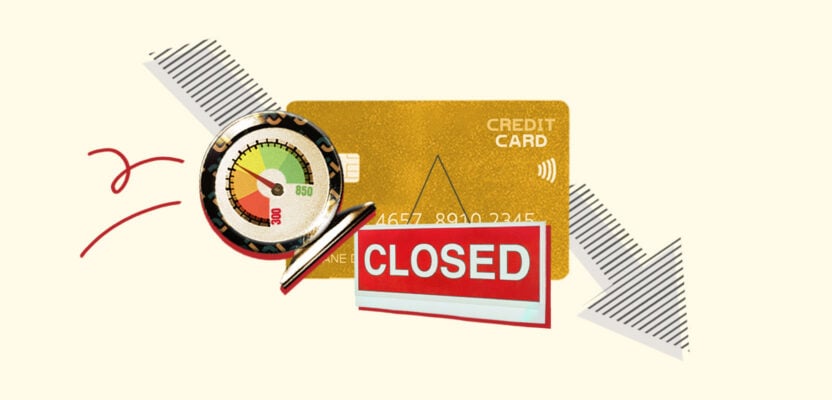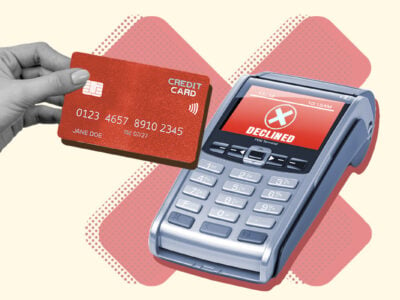If you’ve recently been denied for a credit card, try not to worry. It happens all the time, and it won’t have particularly severe consequences for your finances.
It’s understandable if you’re wondering whether your recent rejection will hurt your credit score. The good news is that getting denied for a credit card won’t hurt your credit score. The bad news is that applying for a credit card can hurt it (regardless of whether your application is approved or not), which might have implications for you if you’re thinking about trying again.
Table of Contents
Does getting rejected for a credit card affect my credit score?
No, getting rejected for a credit card or a loan doesn’t affect your credit score. However, applying for new credit does.
In other words, any time you try to open a new credit card, your credit score will take a hit, regardless of whether or not you’re successful.
How and why applying for credit damages your credit score
When you submit an application for a new credit card, your potential lender will perform a credit check on you called a hard inquiry. Hard inquiries have a small impact on your credit score, lowering it by up to 5 points. Additionally, hard inquiries remain on your credit report for 2 years, although they impact your score for less than a year.
This has obvious implications for you if you’re considering applying for another credit card after getting rejected for your first choice. A single hard inquiry isn’t particularly damaging to your credit (5 points isn’t very much, considering credit scores range from 300 to 850 points). However, if you submit lots of applications in a short period, you’ll incur a lot of hard inquiries and the damage will start to add up.
VantageScore ignores multiple hard inquiries for credit cards
However, the VantageScore credit scoring models (e.g., VantageScore 3.0) ignore multiple hard inquiries that you incur in a short period of time (14 days), as long as all of these inquiries were triggered by applications for the same type of credit account. In your case, that means credit cards.
For example, let’s say you apply for three credit cards around the same time. In VantageScore’s model, instead of having 15 points knocked off your credit score, you’ll only lose around 5 points, just as you would if you had only applied for one credit card.
The purpose of this “de-duplicating” period is to allow you to shop around for credit cards, since VantageScore understands that you might get rejected for your first choice and have to submit multiple applications.
Does FICO also ignore multiple hard inquiries for credit card applications?
Unfortunately, the FICO scoring model doesn’t ignore multiple hard inquiries for credit card applications the way that VantageScore does. It does feature a similar “de-duping,” but only for select types of loans, such as auto loans.
Why did I get denied for a credit card?
If you got denied for a credit card, there are several possible reasons, which we’ll go into below.
Note that your lender is legally required by the Fair Credit Reporting Act (FCRA) to send you something called an “adverse action letter” explaining why you were rejected and instructing you how to view the credit report they used to make their decision.
Additionally, the Equal Credit Opportunity Act (ECOA) protects consumers from credit discrimination based on race, color, religion, national origin, sex, marital status, and age. If you suspect you’ve been the victim of discrimination, you should report it to your state attorney general. 2
Below are some common reasons why credit card applications get denied.
You have a short credit history
If this is your first credit card, it may be difficult for you to qualify for an account because you have an insufficient credit history.
Having a limited (or nonexistent) credit history makes it hard for lenders to assess your creditworthiness, and could be why your application got rejected.
If you keep having trouble with your credit card applications for this reason, you can try applying for cards that are designed specifically for people with limited credit histories. Many issuers offer credit cards specifically for building credit, like the following.
Another option is becoming an authorized user on someone else’s credit card. You’ll receive your own (physical) credit card with access to the same credit line as the primary cardholder, and their account history will appear on your credit report.
This will increase the length of your credit history and bolster your payment history, improving your credit score and giving you access to a credit card that you can use until you qualify for your own.
You have too many hard inquiries
Having a lot of hard inquiries on your credit report not only damages your credit score, it also makes you look like a risky borrower to potential lenders. Submitting repeated applications for new credit suggests you might be in financial trouble.
As mentioned, if you’re applying for multiple credit accounts (of any type, not just credit cards), submit your applications within a short timeframe. Depending on the type of credit you’re applying for and the credit scoring model, applications submitted within 14 to 45 days may be treated as a single inquiry. 3
You should also only apply for new lines of credit when you actually need to in order to avoid too many hard inquiries piling up on your credit report.
You have a bad payment history
Payment history is the most important factor influencing your credit score. It indicates how you’ve managed your debt in the past and how likely you are to repay your loans in the future.
Having a bad payment history with missed or late payments is a red flag for lenders when they review your credit history, and will make them hesitant to approve your credit card application.
To improve your payment history, consider setting up autopay for your accounts to avoid paying late. You should also strive to pay your balance in full each month to keep your outstanding debts low. This will also lower the ratio of your current debts to your available credit, which will improve your score.
How long should I wait to apply for a credit card after being denied?
In general, you should avoid applying for another credit card immediately after your application gets denied. As we’ve noted, although submitting multiple applications isn’t penalized in VantageScore’s credit scoring model, it is in FICO’s, and currently, the majority of lenders still check FICO scores (at least according to FICO themselves). 4
While it’s generally recommended to wait at least 6 months between credit card applications, the exact amount of time you should take before applying for another card depends on your financial situation. 5
If you’re trying to build your credit, be especially careful not to incur multiple hard inquiries in a short time, as this is damaging to your credit score. Take time between applications to improve your score so you’re more likely to get approved for your next credit card.
How to improve your credit card approval odds
To increase your chances of getting your credit card application approved, work to improve your credit score. There are several ways to do this:
- Pay your bills on time and catch up on past-due accounts: Payment history determines 35% of your FICO score, so your first priority should be paying off your outstanding balances.
- Keep your utilization rate low: Try to keep your credit utilization rate below 30%. Credit utilization is the amount of available credit you’re using, so you can lower your rate by extending your available credit limit or by paying down your balance (or both!)
- Consolidate your debts: Debt consolidation can help improve your score by enabling you to pay off your debts more quickly, benefitting your payment history.
- Establish a good credit mix: Having different types of credit, such as credit cards and loans, will help you establish a good credit mix (the variety of accounts you have), which contributes to a higher credit score.






